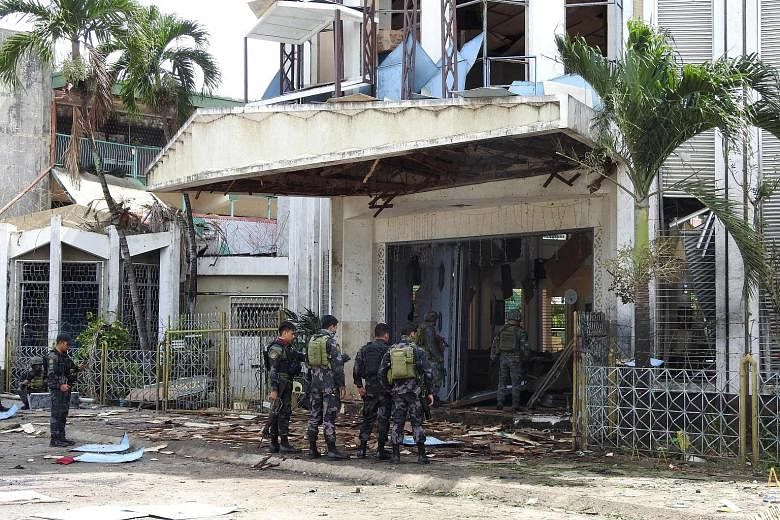Philippine President Rodrigo Duterte yesterday ordered security forces to crush a band of Muslim militants suspected of perpetrating two bomb attacks on a Roman Catholic cathedral in the volatile south that left at least 20 dead and more than 100 wounded.
Security officials tagged six "persons of interest" from the Ajang-ajang faction of the Abu Sayyaf as the main suspects. The Abu Sayyaf has pledged allegiance to the Islamic State in Iraq and Syria (ISIS), which claimed responsibility for the attack.
When asked what Mr Duterte wanted the military and the police to do, Defence Secretary Delfin Lorenzana told reporters: "On the Abu Sayyaf, crush them (for the bombings), and for all the atrocities they have committed so far."
Mr Lorenzana accompanied Mr Duterte during a brief visit to Jolo town in Sulu province, where the militants set off two blasts that tore through the Cathedral of Our Lady of Mount Carmel during mass early on Sunday morning.
A senior military official said the Ajang-ajang faction was formed in 2014 and consists of no more than 60 kin - mostly teenagers - of Abu Sayyaf militants killed over the years by security forces.
Ajang-ajang is an ethnic term in Sulu that means "sons of warriors" or "sons of martyrs".
The military official, who asked not to be named because he was disclosing sensitive information, said the faction had never ventured out of Jolo Island, and mostly stuck to extortion, drug dealing and spotting hostages for the Abu Sayyaf.
Mr Rommel Banlaoi, executive director of the Philippine Institution for Peace, Violence and Terrorism Research, told CNN Philippines the group had apparently levelled up to ideology-fuelled revenge killings.
He named Hatib Sawadjaan, an ISIS sympathiser and father-in-law of Malaysian militant Amin Baco, as among the leaders of the Ajang-ajang faction.
Baco was at one time rumoured to have been designated as the new ISIS emir in South-east Asia, replacing Isnilon Hapilon, the Abu Sayyaf chieftain killed in the 2017 siege of southern Marawi city.
The church attack came nearly a week after over 1.5 million Muslims in the predominantly Catholic nation overwhelmingly approved a more powerful autonomous region in the south. They voted for the new region called Bangsamoro, or nation of Moros, in hopes of ending nearly five decades of separatist rebellion and reining in a new wave of Islamist extremism sweeping war-torn Mindanao Island.
Voters in Sulu, however, rejected it. Still, the province will be included in the new region as it is part of the Autonomous Region in Muslim Mindanao, which as a bloc voted overwhelmingly in favour of the Bangsamoro law.
That has raised fears of reprisals by militant groups, who are opposed to any peace deal with the government and are opting instead to embrace ISIS' wider agenda to establish a caliphate in South-east Asia.
The country's 170,000-strong police force is now on "heightened alert status". This means more checkpoints and patrols, especially around shopping malls, train and bus stations, airports, harbours and other vulnerable targets.
Worst attacks in the Philippines
SIMULTANEOUS BLASTS
On a holiday to remember the country's national hero, Jose Rizal, near-simultaneous bombings in December 2000 killed 22 people and injured more than 100 in Manila. One explosion rocked a plaza across from the US Embassy. Blasts also tore through a train, a passenger bus and a cargo handling facility at the international airport.
DEADLIEST ATTACK
A February 2004 firebombing of a ferry in Manila Bay, which killed 116 people, was the country's deadliest terror attack.
The ship was engulfed in flames as it sailed out of Manila Bay with 899 people on board. Many of them were rescued by small vessels in the area.
The notorious Abu Sayyaf kidnap-for-ransom group, which is suspected of being behind Sunday's church bombing, claimed that it had planted an explosive on board the vessel.
MARKET EXPLOSION
At least 15 people were killed and scores more wounded in December 2004 when a bomb blast tore through a public market in General Santos, one of the biggest Christian-majority cities in the south of the mainly Catholic Philippines.
KILLED WHILE SLEEPING
Gunmen launched a raid in the town of Maluso on the southern island of Basilan in February 2010, killing 11 people. Many of the victims were sleeping when their homes were strafed with bullets. Buildings were later torched. Abu Sayyaf was blamed for the violence.
ATTACK IN PRESIDENT'S HOME TOWN
A September 2016 bombing that ripped through a bustling night market in President Rodrigo Duterte's home town left 15 dead, and was blamed on the Maute gang of Islamist militants that pledged allegiance to the Islamic State in Iraq and Syria (ISIS) group.
The authorities said the militants carried out the violence partly to raise its profile with ISIS.
MARAWI SIEGE
Marawi, the nation's principal Islamic city, was besieged from May to October 2017 by hundreds of heavily armed local and foreign gunmen who the authorities said aimed to establish a South-east Asian base for ISIS.
Swathes of the southern city were destroyed in five months of house-to-house fighting between troops and the Islamists from the Abu Sayyaf and Maute groups that killed nearly 1,200 people.
The attackers were ultimately dislodged, but only after some of the worst urban fighting the nation had seen since World War II.
VAN BOMB
Ten people, including troops and civilians, were killed when a bomb in a van blew up at an army checkpoint in Basilan in July last year. The powerful explosion, claimed by ISIS, occurred after soldiers and pro-government militiamen stopped the vehicle for a search just after dawn. The authorities believe the attacker intended to target a children's event in a nearby town, but set off the bomb on being intercepted.
AGENCE FRANCE-PRESSE

